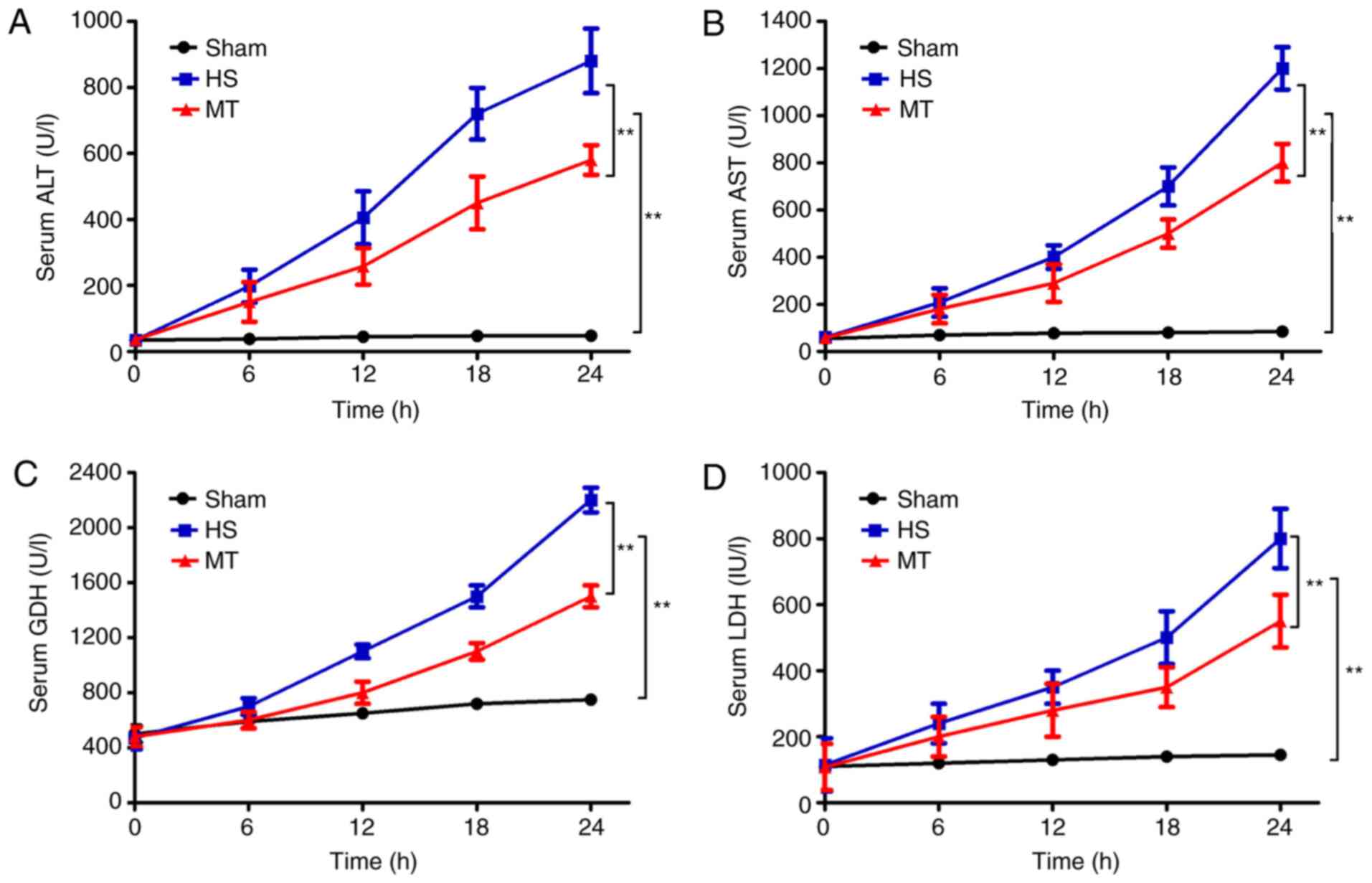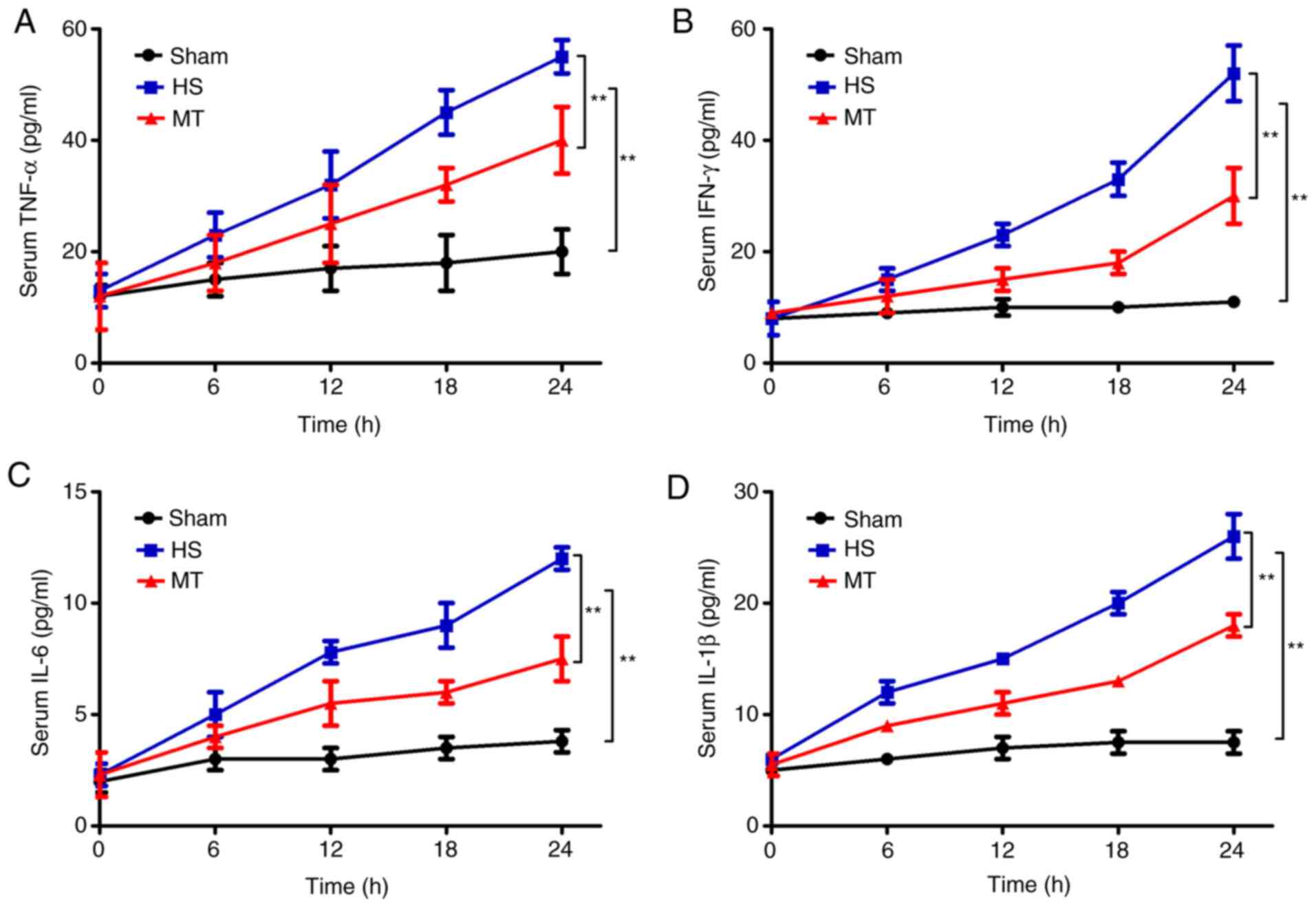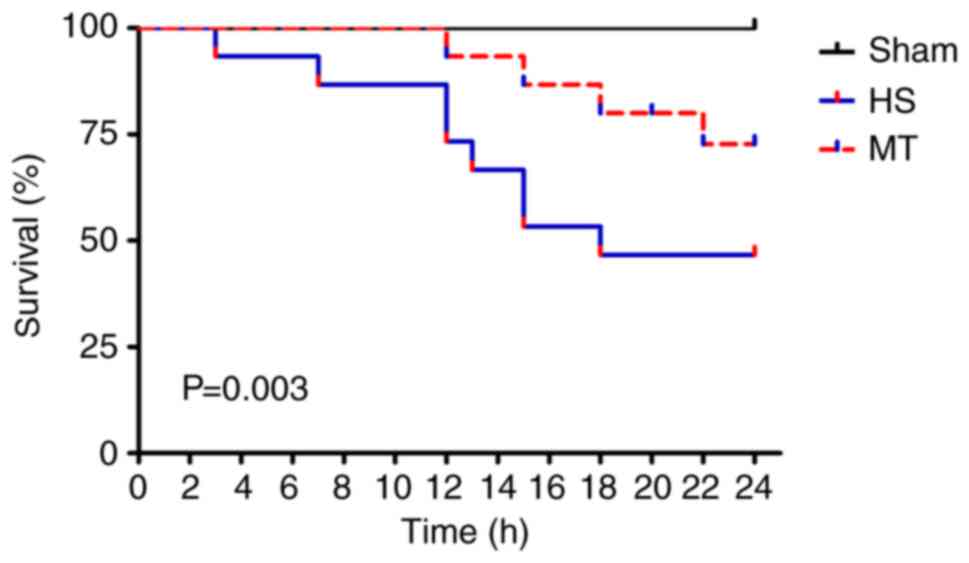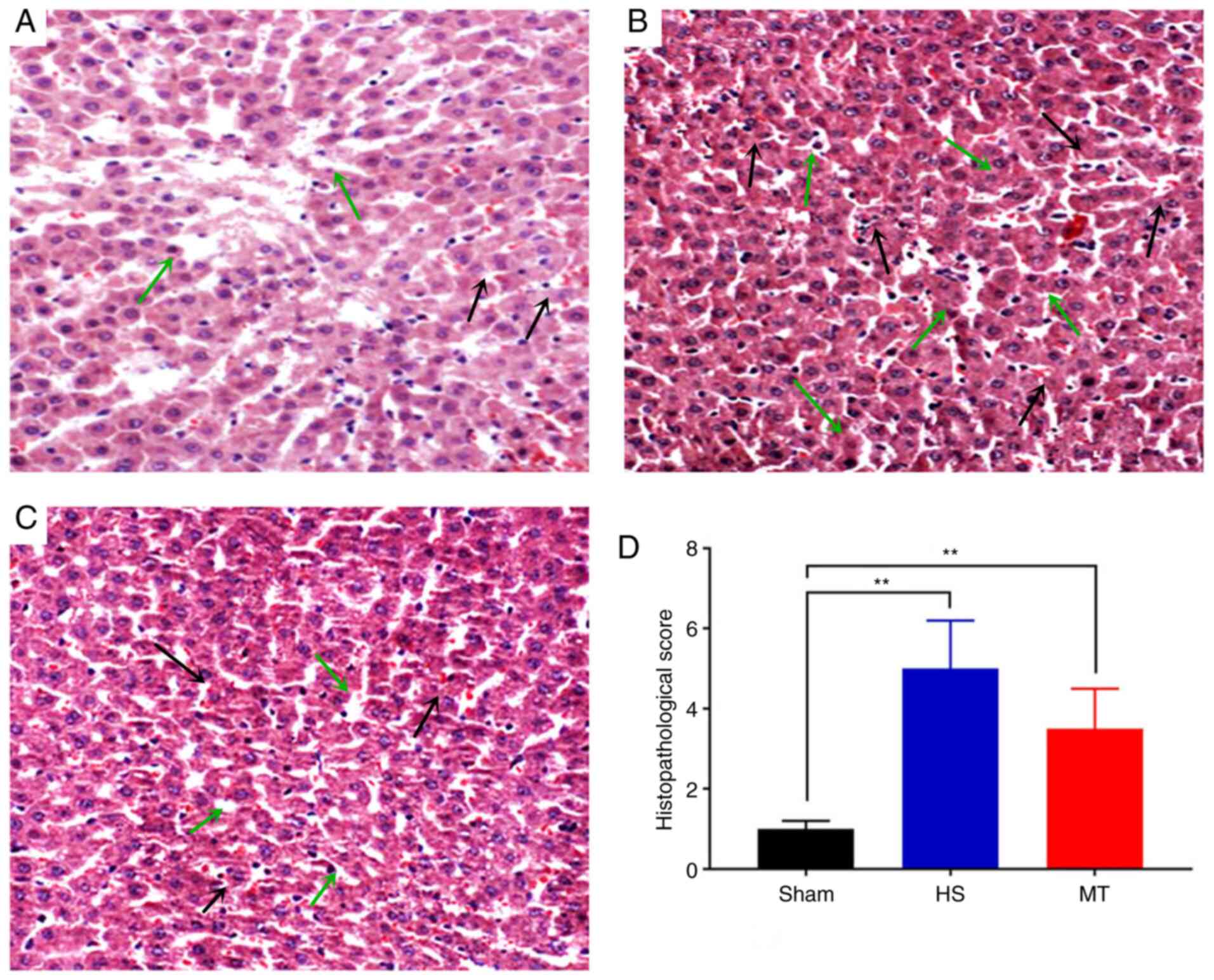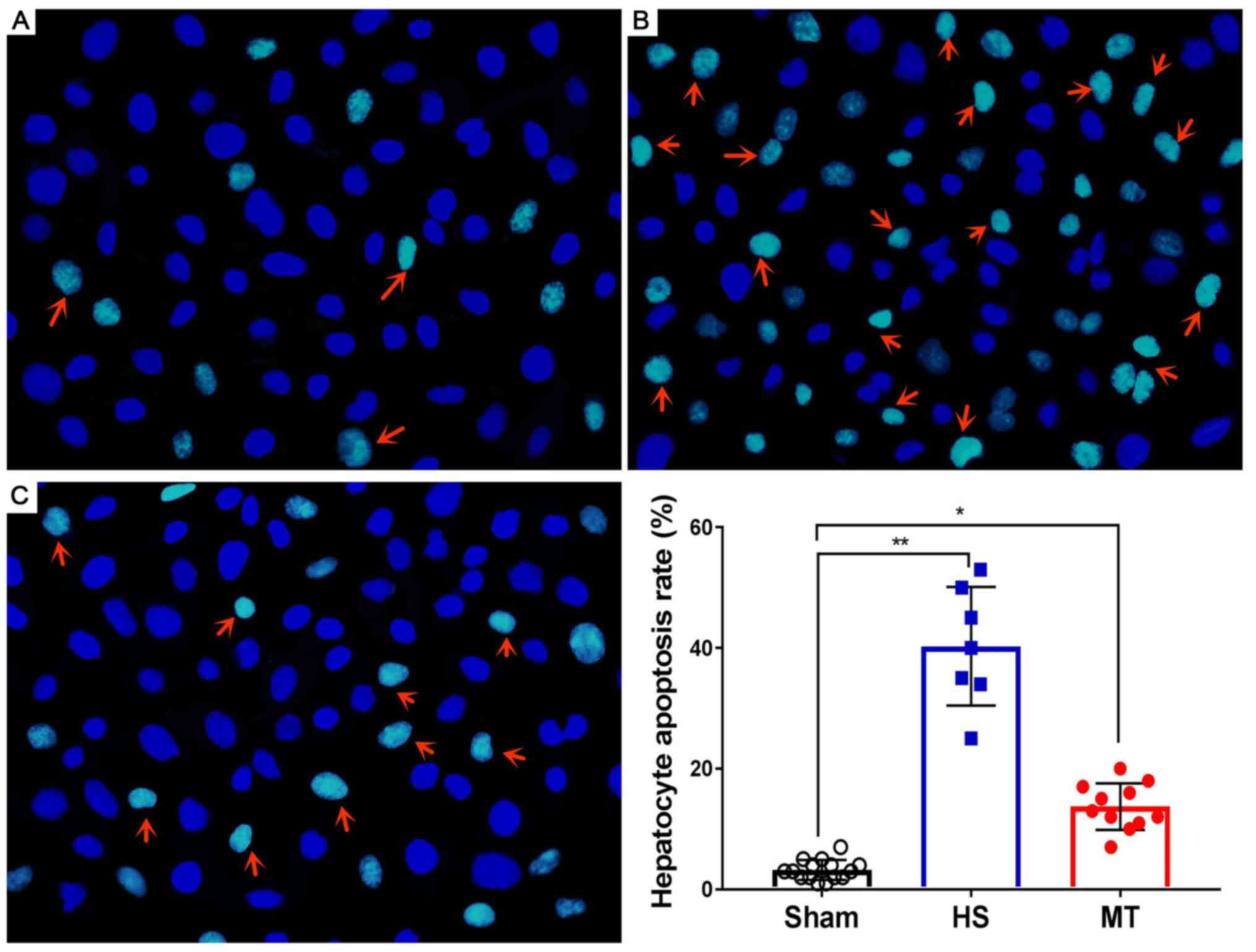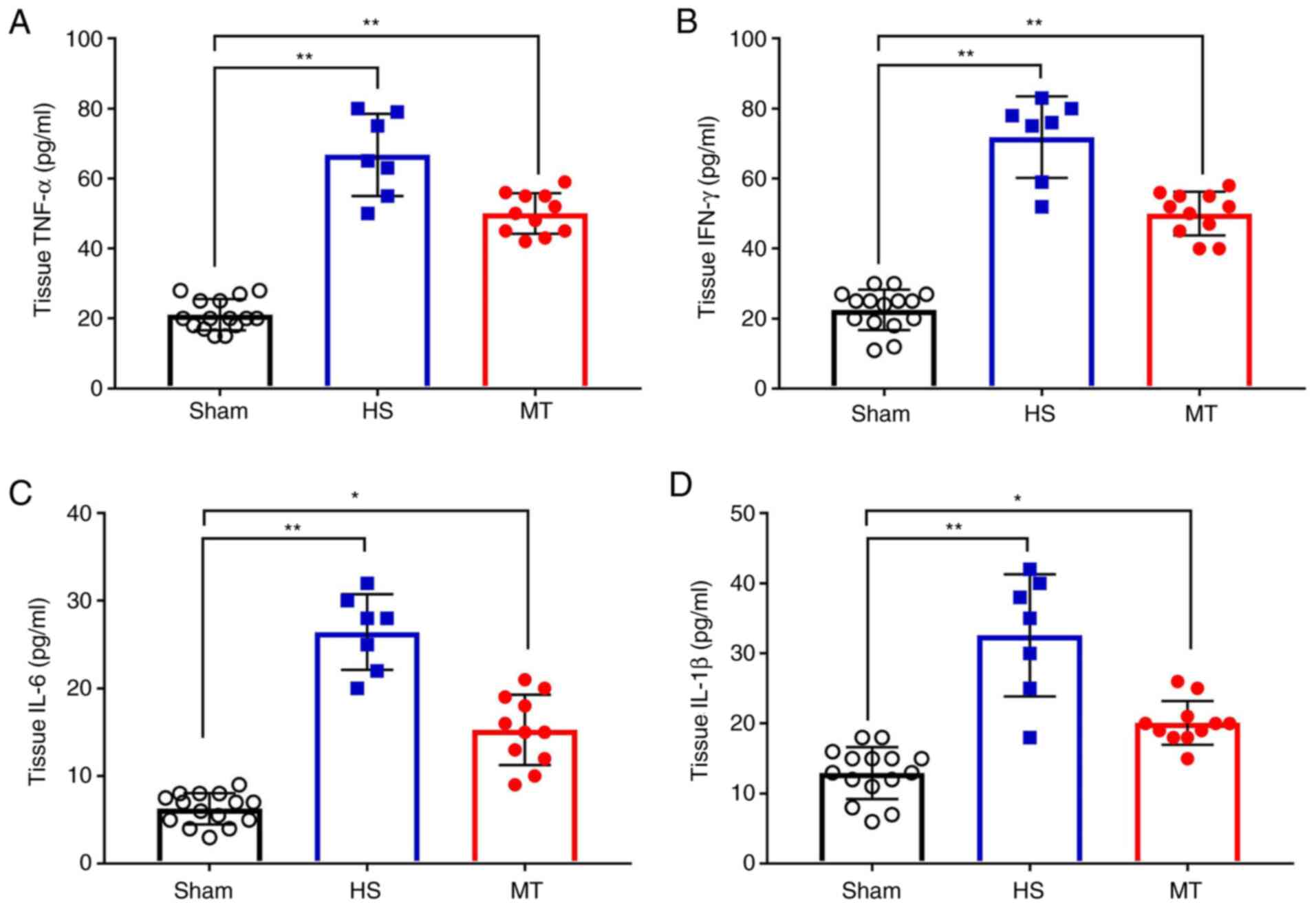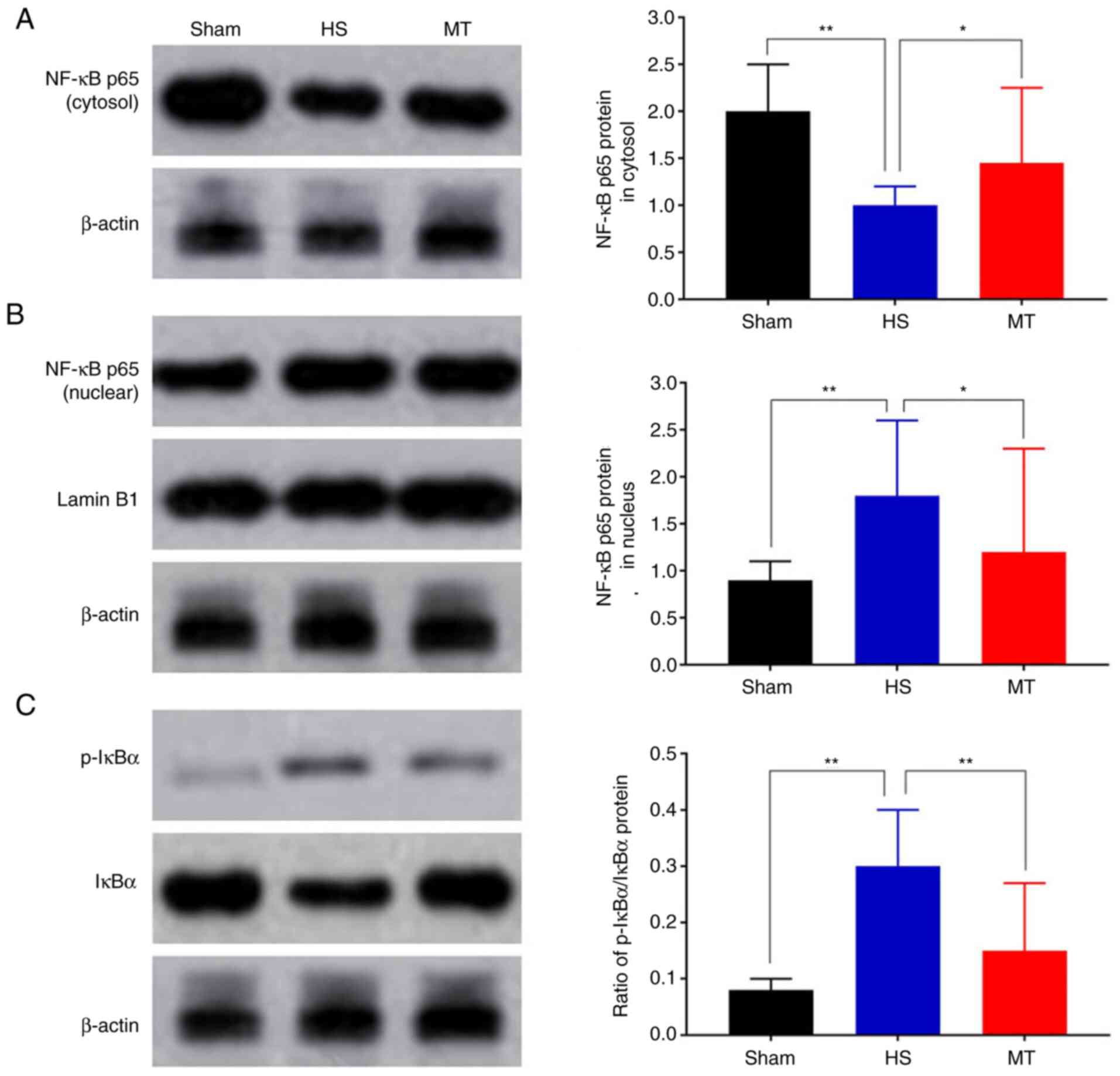|
1
|
Cannon JW: Hemorrhagic shock. N Engl J
Med. 378:370–379. 2018. View Article : Google Scholar : PubMed/NCBI
|
|
2
|
Kezelman C: Trauma-informed care and
practice in nursing. Aust Nurs Midwifery J. 24:282016.PubMed/NCBI
|
|
3
|
Slim C, Zaouali MA, Nassrallah H, Ammar
HH, Majdoub H, Bouraoui A and Abdennebi HB: Protective potential
effects of fucoidan in hepatic cold ischemia-reperfusion injury in
rats. Int J Biol Macromol. 155:498–507. 2020. View Article : Google Scholar : PubMed/NCBI
|
|
4
|
Li Y, Gao M, Xu LN, Yin LH, Qi Y and Peng
JY: MicroRNA-142-3p attenuates hepatic ischemia/reperfusion injury
via targeting of myristoylated alanine-rich C-kinase substrate.
Pharmacol Res. 156:1047832020. View Article : Google Scholar : PubMed/NCBI
|
|
5
|
Ibrahim SG, El-Emam SZ, Mohamed EA and Abd
Ellah MF: Dimethyl fumarate and curcumin attenuate hepatic
ischemia/reperfusion injury via Nrf2/HO-1 activation and
anti-inflammatory properties. Int Immunopharmacol. 80:1061312020.
View Article : Google Scholar : PubMed/NCBI
|
|
6
|
Fliegauf M and Grimbacher B: Nuclear
factor κB mutations in human subjects: The devil is in the details.
J Allergy Clin Immunol. 142:1062–1065. 2018. View Article : Google Scholar : PubMed/NCBI
|
|
7
|
Xiao Y, Huang J, Xu J, Zeng L, Tian J, Lou
Y, Liu Y, Hu B, Tong F and Shen R: Targeted delivery of
puerarin/glycyrrhetinic acid-PEG-PBLA complex attenuated liver
ischemia/reperfusion injury via modulating Toll-like receptor
4/nuclear factor-κB pathway. Ther Deliv. 9:245–255. 2018.
View Article : Google Scholar : PubMed/NCBI
|
|
8
|
Amaral FGD and Cipolla-Neto J: A brief
review about melatonin, a pineal hormone. Arch Endocrinol Metab.
62:472–479. 2018. View Article : Google Scholar : PubMed/NCBI
|
|
9
|
Carrascal L, Nunez-Abades P, Ayala A and
Cano M: Role of melatonin in the inflammatory process and its
therapeutic potential. Curr Pharm Des. 24:1563–1588. 2018.
View Article : Google Scholar : PubMed/NCBI
|
|
10
|
Tang YL, Sun X, Huang LB, Liu XJ, Qin G,
Wang LN, Zhang XL, Ke ZY, Luo JS, Liang C, et al: Melatonin
inhibits MLL-rearranged leukemia via RBFOX3/hTERT and NF-κB/COX-2
signaling pathways. Cancer Lett. 443:167–178. 2019. View Article : Google Scholar : PubMed/NCBI
|
|
11
|
https://www.nc3rs.org.uk/arrive-guidelines
|
|
12
|
ATLS Subcommittee: American College of
Surgeons' Committee on Trauma; International ATLS working group, .
Advanced trauma life support (ATLS(R)): The ninth edition. J Trauma
Acute Care Surg. 74:1363–1366. 2013. View Article : Google Scholar : PubMed/NCBI
|
|
13
|
Jiang H, Liu J, Xu Z and Zheng C: Efficacy
of different fluid resuscitation methods on coagulation function of
rats with traumatic hemorrhagic shock. J Surg Res. 260:259–266.
2020. View Article : Google Scholar : PubMed/NCBI
|
|
14
|
Suzuki S, Nakamura S, Koizumi T, Sakaguchi
S, Baba S, Muro H and Fujise Y: The beneficial effect of a
prostaglandin I2 analog on ischemic rat liver. Transplantation.
52:979–983. 1991. View Article : Google Scholar : PubMed/NCBI
|
|
15
|
Livak KJ and Schmittgen TD: Analysis of
relative gene expression data using real-time quantitative PCR and
the 2(-Delta Delta C(T)) method. Methods. 25:402–408. 2001.
View Article : Google Scholar : PubMed/NCBI
|
|
16
|
Behrends M, Martinez-Palli G, Niemann CU,
Cohen S, Ramachandran R and Hirose R: Acute hyperglycemia worsens
hepatic ischemia/reperfusion injury in rats. J Gastrointest Surg.
14:528–535. 2010. View Article : Google Scholar : PubMed/NCBI
|
|
17
|
Sommer JL, El-Gabalawy R, Taillieu T,
Afifi TO and Carleton RN: Associations between trauma exposure and
physical conditions among public safety personnel. Can J
Psychiatry. 12:548–558. 2020. View Article : Google Scholar
|
|
18
|
Türedi S, Şahin A, Akça M, Demir S, Köse
GDR, Çekiç AB, Yıldırım M, Yuluğ E, Menteşe A, Türkmen S and Acar
S: Ischemia-modified albumin and the IMA/albumin ratio in the
diagnosis and staging of hemorrhagic shock: A randomized controlled
experimental study. Ulus Travma Acil Cerrahi Derg. 26:153–162.
2020.PubMed/NCBI
|
|
19
|
Kyriakopoulos G, Tsaroucha AK, Valsami G,
Lambropoulou M, Kostomitsopoulos N, Christodoulou E, Kakazanis Z,
Anagnostopoulos C, Tsalikidis C and Simopoulos CE: Silibinin
improves TNF-α and M30 expression and histological parameters in
rat kidneys after hepatic ischemia/reperfusion. J Invest Surg.
31:201–209. 2018. View Article : Google Scholar : PubMed/NCBI
|
|
20
|
Ye Y, Wang W, Zhang W, Peng Y, Liu Y, Yu
S, Chen Q, Geng L, Zhou L, Xie H, et al: Galectin-1 attenuates
hepatic ischemia reperfusion injury in mice. Int Immunopharmacol.
77:1059972019. View Article : Google Scholar : PubMed/NCBI
|
|
21
|
Zhang J, Yan X, Tian Y, Li W, Wang H, Li
Q, Li Y, Li Z and Wu T: Synthesis of a new water-soluble melatonin
derivative with low toxicity and a strong effect on sleep aid. ACS
Omega. 5:6494–6499. 2020. View Article : Google Scholar : PubMed/NCBI
|
|
22
|
Pranil T, Moongngarm A and Loypimai P:
Influence of pH, temperature, and light on the stability of
melatonin in aqueous solutions and fruit juices. Heliyon.
6:e036482020. View Article : Google Scholar : PubMed/NCBI
|
|
23
|
Ullah U, Badshah H, Malik Z, Uddin Z, Alam
M, Sarwar S, Aman A, Khan AU and Shah FA: Hepatoprotective effects
of melatonin and celecoxib against ethanol-induced hepatotoxicity
in rats. Immunopharmacol Immunotoxicol. 42:255–263. 2020.
View Article : Google Scholar : PubMed/NCBI
|
|
24
|
Yu HY, Meng LF, Lu XH, Liu LH, Ci X and
Zhuo Z: Protective effect of miR-146 against kidney injury in
diabetic nephropathy rats through mediating the NF-κB signaling
pathway. Eur Rev Med Pharmacol Sci. 24:3215–3222. 2020.PubMed/NCBI
|
|
25
|
Jia Y, He W, Zhang H, He L, Wang Y, Zhang
T, Peng J, Sun P and Qian Y: Morusin ameliorates IL-1β-induced
chondrocyte inflammation and osteoarthritis via NF-κB signal
pathway. Drug Des Devel Ther. 14:1227–1240. 2020. View Article : Google Scholar : PubMed/NCBI
|
|
26
|
Feng Y, Duan T, Du Y, Jin S, Wang M, Cui J
and Wang RF: LRRC25 functions as an inhibitor of NF-κB signaling
pathway by promoting p65/RelA for autophagic degradation. Sci Rep.
7:134482017. View Article : Google Scholar : PubMed/NCBI
|
|
27
|
Boisson B, Puel A, Picard C and Casanova
JL: Human IκBα gain of function: A severe and syndromic
immunodeficiency. J Clin Immunol. 37:397–412. 2017. View Article : Google Scholar : PubMed/NCBI
|
|
28
|
Rahimova N, Babazada H, Higuchi Y,
Yamashita F and Hashida M: Development of mKO2 fusion proteins for
real-time imaging and mechanistic investigation of the degradation
kinetics of human IκBα in living cells. Biochim Biophys Acta Mol
Cell Res. 1866:190–198. 2019. View Article : Google Scholar : PubMed/NCBI
|
|
29
|
Kanan T, Kanan D, Erol I, Yazdi S, Stein M
and Durdagi S: Targeting the NF-κB/IκBα complex via fragment-based
E-Pharmacophore virtual screening and binary QSAR models. J Mol
Graph Model. 86:264–277. 2019. View Article : Google Scholar : PubMed/NCBI
|
|
30
|
Shi CX, Qi QH, Xu J and Zhao WW:
Protective effect of magnesium sulfate on cranial nerves in
preeclampsia rats through NF-κB/ICAM-1 pathway. Eur Rev Med
Pharmacol Sci. 24:2785–2794. 2020.PubMed/NCBI
|
|
31
|
Gu H, Shen Q, Mei D, Yang Y, Wei R and Ni
M: Melatonin inhibits TE-1 esophageal cancer cells metastasis by
suppressing the NF-κB signaling pathway and decreasing MMP-9. Ann
Clin Lab Sci. 50:65–72. 2020.PubMed/NCBI
|
|
32
|
Chen F, Jiang G, Liu H, Li Z, Pei Y, Wang
H, Pan H, Cui H, Long J, Wang J and Zheng Z: Melatonin alleviates
intervertebral disc degeneration by disrupting the
IL-1β/NF-κB-NLRP3 inflammasome positive feedback loop. Bone Res.
8:102020. View Article : Google Scholar : PubMed/NCBI
|
|
33
|
Tiong YL, Ng KY, Koh RY, Ponnudurai G and
Chye SM: Melatonin prevents oxidative stress-induced mitochondrial
dysfunction and apoptosis in high glucose-treated schwann cells via
upregulation of Bcl2, NF-κB, mTOR, wnt signalling pathways.
Antioxidants (Basel). 8:1982019. View Article : Google Scholar
|















